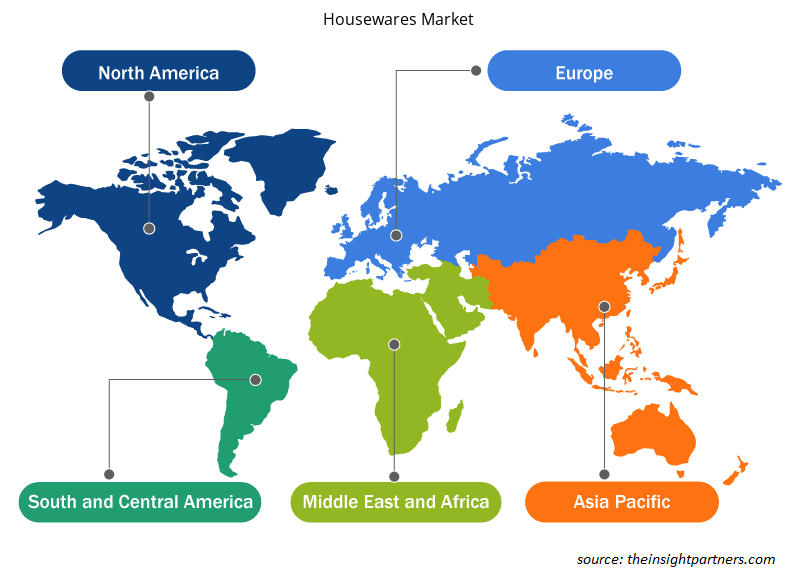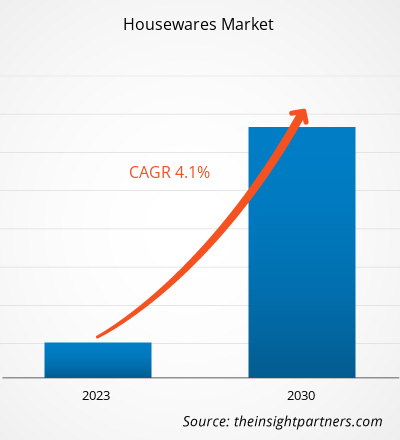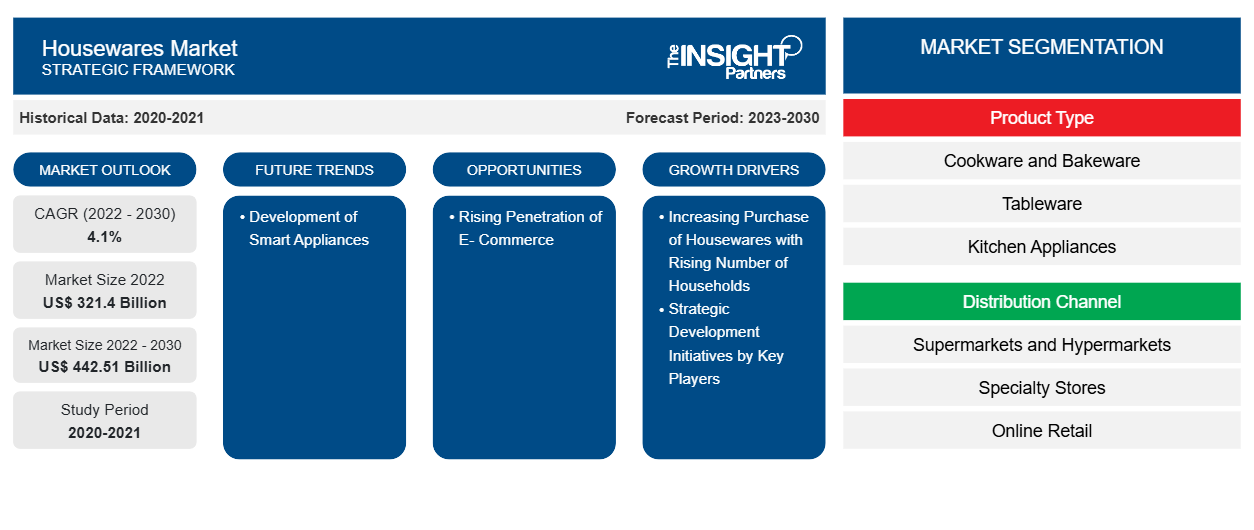[تقرير بحثي] تم تقييم حجم سوق الأدوات المنزلية بـ 321.40 مليار دولار أمريكي في عام 2022 ومن المتوقع أن يصل إلى 442.51 مليار دولار أمريكي بحلول عام 2030؛ ومن المتوقع أن يسجل معدل نمو سنوي مركب بنسبة 4.1٪ من عام 2022 إلى عام 2030.
رؤى السوق ووجهة نظر المحلل:
الأدوات المنزلية هي المنتجات والعناصر المستخدمة داخل المنزل للطهي والخبز وتنظيم المنزل، من بين أغراض أخرى. وقد شهد سوق الأدوات المنزلية نموًا مطردًا بسبب عوامل مثل أنماط الحياة المتغيرة وقضاء المزيد من الوقت في المنزل، مما أدى إلى زيادة الطلب على الأدوات المنزلية الوظيفية والجميلة. وخلال جائحة كوفيد-19، أمضى الناس المزيد من الوقت في المنزل واستثمروا في تحسين مساحات معيشتهم. بالإضافة إلى ذلك، أدى ارتفاع التجارة الإلكترونية ومنصات التسوق عبر الإنترنت إلى تسهيل وصول المستهلكين إلى مجموعة واسعة من منتجات الأدوات المنزلية وشرائها من منازلهم. هذه العوامل، إلى جانب التصميمات المبتكرة والخيارات المستدامة التي توفرها شركات الأدوات المنزلية، تعمل على توسع سوق الأدوات المنزلية.
محركات النمو والتحديات:
لقد أدت التغيرات الديناميكية في نمط الحياة وارتفاع عدد الأسر ذات الدخل المزدوج إلى ارتفاع مفاجئ في الدخول المتاحة وتحسين مستويات معيشة الأسر. ومع زيادة الدخول المتاحة، ينفق المستهلكون مبالغ كبيرة على الأدوات المنزلية والأجهزة الأخرى التي تدعم المعيشة المريحة. وهم غالبًا على استعداد لشراء منتجات جديدة نظرًا لأنماطها الفريدة، والتي تروق لشخصيتهم، مما يؤدي إلى زيادة وتيرة الشراء. وعلاوة على ذلك، فإن العدد المتزايد من الأسر المكونة من شخص واحد يثير الحاجة إلى تعديلات المنزل، وبالتالي دفع الطلب على الأدوات المنزلية مثل أدوات المطبخ وأواني الطهي وأدوات الخبز وأدوات المائدة ومستلزمات الحمام.
علاوة على ذلك، أدى ارتفاع معدلات التحضر إلى تعزيز الطلب على الوحدات السكنية، وفي النهاية، منتجات الأدوات المنزلية. ووفقًا لمكتب الإحصاء الأمريكي ووزارة الإسكان والتنمية الحضرية الأمريكية، أكملت الولايات المتحدة بناء حوالي 1.3 مليون وحدة سكنية في عام 2021، في حين كان بناء حوالي 1.7 مليون وحدة سكنية قيد التنفيذ. وبالمثل، أدى ارتفاع معدلات التحضر في الدول الأوروبية إلى خلق طلب كبير على المساكن السكنية. ووفقًا للمفوضية الأوروبية، زادت تصاريح البناء السكني بنسبة 42.3٪ من عام 2015 إلى عام 2021 في الاتحاد الأوروبي. في عام 2021، كانت فرنسا وألمانيا وبولندا مسؤولة عن معظم عمليات البدء في البناء السكني في أوروبا. وبالتالي، فإن زيادة بناء الوحدات السكنية في مختلف البلدان يعزز الطلب على الأدوات المنزلية. وبالتالي، فإن الشراء المتزايد للأدوات المنزلية جنبًا إلى جنب مع العدد المتزايد من الأسر يدفع نمو سوق الأدوات المنزلية.
ومع ذلك، فإن سوق الأدوات المنزلية مجزأة للغاية وغير منظمة بسبب العديد من الشركات الخاصة الصغيرة غير المستغلة والباعة الجائلين الذين يعملون في البلدان النامية. وفقًا لمقال نُشر في Business Standards، اعتبارًا من عام 2020، كان 80٪ من سوق أدوات المطبخ غير منظم في الهند. تستخدم الشركات الصغيرة المحلية مواد خام منخفضة الجودة لتصنيع الأدوات المنزلية مثل أدوات الطهي وأواني الخبز وإكسسوارات الحمام وأدوات المائدة. يؤدي استخدام المواد الخام منخفضة الجودة إلى منتجات نهائية رديئة الجودة وعرضة للتلف. كما تقدم الشركات المصنعة هذه المنتجات بتكاليف منخفضة؛ لذلك، يشتري غالبية المستهلكين هذه المنتجات بسبب القدرة على تحمل التكاليف وسهولة التوافر. يؤدي هذا العامل إلى انكماش قاعدة عملاء مصنعي الأدوات المنزلية الرئيسيين.
علاوة على ذلك، في كثير من الأحيان، لا يلتزم المصنعون المحليون في سوق الأدوات المنزلية غير المنظمة بالمعايير التنظيمية، مما قد يثير قضايا الجودة ويعيق تصور المستهلكين لمنتجات الأدوات المنزلية. علاوة على ذلك، فإن توافر المنتجات المقلدة يمكن أن يعيق صورة العلامة التجارية للاعبين الرئيسيين. وبالتالي، فإن الافتقار إلى التوحيد في العمليات واللوائح يعيق نمو سوق الأدوات المنزلية.
قم بتخصيص هذا التقرير ليناسب متطلباتك
ستحصل على تخصيص لأي تقرير - مجانًا - بما في ذلك أجزاء من هذا التقرير، أو تحليل على مستوى الدولة، وحزمة بيانات Excel، بالإضافة إلى الاستفادة من العروض والخصومات الرائعة للشركات الناشئة والجامعات
-
احصل على أهم اتجاهات السوق الرئيسية لهذا التقرير.ستتضمن هذه العينة المجانية تحليلاً للبيانات، بدءًا من اتجاهات السوق وحتى التقديرات والتوقعات.
تقسيم التقرير ونطاقه:
يتم تقسيم سوق الأدوات المنزلية العالمية على أساس نوع المنتج وقناة التوزيع والجغرافيا. بناءً على نوع المنتج، يتم تصنيف السوق إلى أدوات الطهي وأواني الخبز وأدوات المائدة وأجهزة المطبخ ومستلزمات الحمام وغيرها. حسب قناة التوزيع، يتم تصنيف السوق إلى محلات السوبر ماركت والهايبر ماركت والمتاجر المتخصصة وتجارة التجزئة عبر الإنترنت وغيرها. حسب الجغرافيا، يتم تقسيم سوق الأدوات المنزلية العالمية على نطاق واسع إلى أمريكا الشمالية وأوروبا ومنطقة آسيا والمحيط الهادئ والشرق الأوسط وأفريقيا وأمريكا الجنوبية والوسطى.
التحليل القطاعي:
بناءً على نوع المنتج، يتم تصنيف سوق الأدوات المنزلية إلى أدوات الطهي وأواني الخبز وأدوات المائدة وأجهزة المطبخ ومستلزمات الحمام وغيرها. ومن المتوقع أن يسجل قطاع أدوات المائدة أعلى معدل نمو سنوي مركب خلال الفترة 2022-2030. يشمل قطاع أدوات المائدة منتجات مثل الأواني الفخارية وأدوات المائدة والأواني الزجاجية وأدوات التقديم. يمكن أن يُعزى الارتفاع في الطلب على أدوات المائدة في سوق الأدوات المنزلية إلى عادات تناول الطعام المتغيرة أثناء جائحة كوفيد-19. مع تناول المزيد من الناس الطعام في المنزل، بدأ الناس في التركيز على أدوات المائدة الجمالية والوظيفية، لأنها تعزز تجارب تناول الطعام في المنزل. من الوجبات اليومية إلى التجمعات الخاصة، يبحث المستهلكون عن مجموعات أدوات المائدة التي ترتقي بتجربة تناول الطعام الخاصة بهم. علاوة على ذلك، يلعب التقدير المتزايد للتصاميم الفريدة والحرفية دورًا مهمًا في دفع الطلب على أدوات المائدة. ينجذب المستهلكون بشكل متزايد إلى قطع أدوات المائدة المصنوعة يدويًا والمستوحاة من الفن والتي تضفي لمسة من الفردية والشخصية على إعدادات تناول الطعام الخاصة بهم. وبالتالي، ساهم التحول نحو خيارات أدوات المائدة الأكثر تخصيصًا وجاذبية بصريًا في تقدم سوق أدوات المائدة. تعد Vivo - Villeroy & Boch Group وCorelle وPyrex وLuminarc وSchott Zwiesel من بين اللاعبين البارزين العاملين في سوق أدوات المائدة.
التحليل الإقليمي:
تم تقسيم سوق الأدوات المنزلية إلى خمس مناطق رئيسية: أمريكا الشمالية وأوروبا وآسيا والمحيط الهادئ وأمريكا الجنوبية والوسطى والشرق الأوسط وأفريقيا. سيطرت منطقة آسيا والمحيط الهادئ على سوق الأدوات المنزلية العالمية في عام 2022 حيث بلغت قيمة السوق في هذه المنطقة 120.63 مليار دولار أمريكي في ذلك العام. تعد أوروبا ثاني أكبر مساهم، حيث تمتلك أكثر من 23٪ من حصة السوق العالمية. ومن المتوقع أن تسجل منطقة آسيا والمحيط الهادئ معدل نمو سنوي مركب كبير يتجاوز 5٪ خلال الفترة 2022-2030. يعد التوسع الحضري المتزايد والدخل المتاح لسكان الطبقة المتوسطة عاملاً رئيسيًا يدفع الطلب على الأدوات المنزلية الحديثة والمريحة، بما في ذلك الأجهزة المطبخية المتقدمة وأدوات المائدة الأنيقة.
رؤى إقليمية حول سوق الأدوات المنزلية
لقد قام المحللون في Insight Partners بشرح الاتجاهات والعوامل الإقليمية المؤثرة على سوق الأدوات المنزلية طوال فترة التوقعات بشكل شامل. يناقش هذا القسم أيضًا قطاعات سوق الأدوات المنزلية والجغرافيا في جميع أنحاء أمريكا الشمالية وأوروبا ومنطقة آسيا والمحيط الهادئ والشرق الأوسط وأفريقيا وأمريكا الجنوبية والوسطى.

- احصل على البيانات الإقليمية المحددة لسوق الأدوات المنزلية
نطاق تقرير سوق الأدوات المنزلية
| سمة التقرير | تفاصيل |
|---|---|
| حجم السوق في عام 2022 | 321.4 مليار دولار أمريكي |
| حجم السوق بحلول عام 2030 | 442.51 مليار دولار أمريكي |
| معدل النمو السنوي المركب العالمي (2022 - 2030) | 4.1% |
| البيانات التاريخية | 2020-2021 |
| فترة التنبؤ | 2023-2030 |
| القطاعات المغطاة |
حسب نوع المنتج
|
| المناطق والدول المغطاة |
أمريكا الشمالية
|
| قادة السوق وملفات تعريف الشركات الرئيسية |
|
كثافة اللاعبين في السوق: فهم تأثيرها على ديناميكيات الأعمال
يشهد سوق الأدوات المنزلية نموًا سريعًا، مدفوعًا بالطلب المتزايد من جانب المستخدم النهائي بسبب عوامل مثل تفضيلات المستهلكين المتطورة والتقدم التكنولوجي والوعي المتزايد بفوائد المنتج. ومع ارتفاع الطلب، تعمل الشركات على توسيع عروضها والابتكار لتلبية احتياجات المستهلكين والاستفادة من الاتجاهات الناشئة، مما يؤدي إلى زيادة نمو السوق.
تشير كثافة اللاعبين في السوق إلى توزيع الشركات أو المؤسسات العاملة في سوق أو صناعة معينة. وهي تشير إلى عدد المنافسين (اللاعبين في السوق) الموجودين في مساحة سوق معينة نسبة إلى حجمها أو قيمتها السوقية الإجمالية.
الشركات الرئيسية العاملة في سوق الأدوات المنزلية هي:
- برادشو هوم إنك
- شركة دينبي للفخار المحدودة
- شركة إتش إف كورز المحدودة
- شركة انتر ايكيا القابضة
- شركة هوتزلر للتصنيع المحدودة
إخلاء المسؤولية : الشركات المذكورة أعلاه ليست مرتبة بأي ترتيب معين.

- احصل على نظرة عامة على أهم اللاعبين الرئيسيين في سوق الأدوات المنزلية
تأثير جائحة كوفيد-19:
أعاقت جائحة كوفيد-19 في البداية سوق الأدوات المنزلية العالمية بسبب إغلاق وحدات التصنيع ونقص العمالة وتعطل سلاسل التوريد وعدم الاستقرار المالي. أدى تعطيل العمليات في مختلف الصناعات بسبب التباطؤ الاقتصادي الناجم عن تفشي كوفيد-19 إلى تقييد إمدادات الأدوات المنزلية. علاوة على ذلك، تم إغلاق العديد من المتاجر، مما حد من مبيعات الأدوات المنزلية. ومع ذلك، بدأت الشركات في اكتساب أرضية حيث تم إلغاء القيود المفروضة سابقًا في مختلف البلدان في عام 2021. علاوة على ذلك، أدى تنفيذ حملات التطعيم ضد كوفيد-19 من قبل حكومات بلدان مختلفة إلى تخفيف الوضع، مما أدى إلى ارتفاع الأنشطة التجارية في جميع أنحاء العالم. سجلت العديد من الأسواق، بما في ذلك سوق الأدوات المنزلية، نموًا بعد تخفيف عمليات الإغلاق والقيود على الحركة.
المنافسة والشركات الرئيسية:
تعد شركة Bradshaw Home Inc، وDenby Pottery، وHF Coors Co Inc، وInter Ikea Holding Bv، وHutzler Manufacturing Co Inc، وTTK Prestige Ltd، وNewell Brands Inc، وBSH Hausgerate GmbH، وKohler Co، وHaier US Appliance Solutions Inc من بين اللاعبين البارزين الذين يعملون في سوق الأدوات المنزلية العالمية.
- التحليل التاريخي (سنتان)، سنة الأساس، التوقعات (7 سنوات) مع معدل النمو السنوي المركب
- تحليل PEST و SWOT
- حجم السوق والقيمة / الحجم - عالمي، إقليمي، بلد
- الصناعة والمنافسة
- مجموعة بيانات إكسل
التقارير الحديثة
شهادات العملاء
سبب الشراء
- اتخاذ قرارات مدروسة
- فهم ديناميكيات السوق
- تحليل المنافسة
- رؤى العملاء
- توقعات السوق
- تخفيف المخاطر
- التخطيط الاستراتيجي
- مبررات الاستثمار
- تحديد الأسواق الناشئة
- تحسين استراتيجيات التسويق
- تعزيز الكفاءة التشغيلية
- مواكبة التوجهات التنظيمية























 احصل على عينة مجانية ل - سوق الأدوات المنزلية
احصل على عينة مجانية ل - سوق الأدوات المنزلية